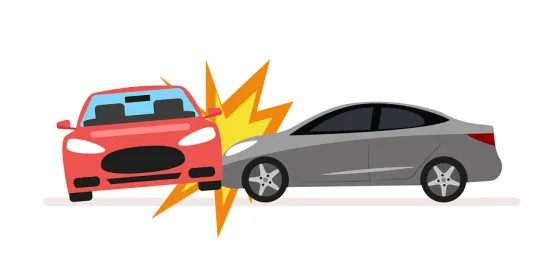What Car Accident Injuries Could be Missed?
 Car accidents are random events you don’t expect. After the crash, you may feel numb because of the shock to your system. Some injuries may be obvious, but you might not be aware of all the harm you suffered.
Car accidents are random events you don’t expect. After the crash, you may feel numb because of the shock to your system. Some injuries may be obvious, but you might not be aware of all the harm you suffered.
Hidden injuries are a primary reason you should seek medical attention as soon as possible after an accident. A healthcare professional may be able to spot problems before you can, and a delay could make your injury worse. Quickly getting medical attention also helps your compensation claim.
But many potential injuries are difficult or impossible to diagnose immediately. You should be aware of them if you feel or see their symptoms.
Cervical Strain/Whiplash
A common car accident injury is a cervical strain or whiplash injury. Your cervical spine supports your head. It starts at the top of the spine and goes down to your shoulders. The force of the accident, especially one from the rear, can force your head to swing back and forth rapidly. It can injure the bones of the spine (the vertebrae), discs between the bones, ligaments, muscles, nerves, and other tissues of the neck.
Whiplash can result in severe neck pain, limited range of motion, and pain that spreads down your arms, according to the Mayo Clinic. Factors that may lead to more severe symptoms include having whiplash in the past, being older, already suffering back or neck pain, and a high-speed crash.
Symptoms may not appear for a few days. Whiplash injuries cause pain and can limit what you do. Treatments can include pain management, exercise, and physical therapy. Wearing a foam collar around your neck may help relieve pain and make it easier to sleep.
Herniated Disc
Between the vertebrae are spongy discs. A disc can slip (or herniate) during an accident, causing its center to push through a tear in the outer part. This can happen anywhere in the spine and irritate a nearby nerve. It can cause pain, numbness, or weakness in an arm or leg, reports the Mayo Clinic. If severe enough, a herniated disc may cause paralysis.
You may not feel herniated disc symptoms immediately. Treatment can include pain management, muscle relaxants, cortisone injections, and physical therapy. Surgery may be suggested if you don’t show improvement.
Concussion
A concussion is a type of traumatic brain injury. The same kind of violent head movement that can cause whiplash, or if your head hits something solid like a window or steering wheel, can result in a concussion. When your head rapidly jerks back and forth or strikes something, your brain can hit the inside of your skull, causing injuries within the brain.
You may suffer many symptoms, some of which may be delayed. They include headaches, confusion, loss of memory, drowsiness, dizziness, double or blurred vision, balance problems, nausea, vomiting, and sensitivity to noise and light. Treatment usually consists of pain management, physical and mental rest.
Internal Bleeding
Bleeding inside your body caused by the accident may not be apparent at first. You could suffer organ damage without knowing it, not realizing you could be in grave danger. You could injure your heart, lungs, liver, brain, or spleen. Large blood vessels also can be harmed in a car crash.
Symptoms can include abdominal pain and swelling, purple-colored skin, swelling or pain in a leg, headaches, dizziness, fainting, or seizures. It may be hours or days after the accident before symptoms show. If they happen to you, go to your nearest hospital’s emergency department. Healthcare providers may suggest waiting to see if the bleeding stops or surgery.
Psychological Issues
A car accident can be a traumatic, painful, frightening experience. There may have been many vehicles involved, and a loved one may also have been injured or killed. You could have suffered severe pain while being trapped in your vehicle or suffered severe burns if your car caught fire. Treatment of your injuries could be long, difficult, and painful.
You could experience a range of thoughts and feelings long after physical injuries are treated. You could be emotionally traumatized, suffering from anxiety, insomnia, nightmares, and depression. You may constantly replay the accident in your head, second guess yourself about what you could’ve done to avoid it, or wrongly blame yourself for the crash. Your mental state could impact your physical health, relationships with others, and your ability to work.
You could become phobic and be unable to get into or drive a car. You may develop post-traumatic stress disorder (PTSD) after a car crash. A diagnosis is essential for you to get proper treatment and return to mental health.




 />i
/>i
